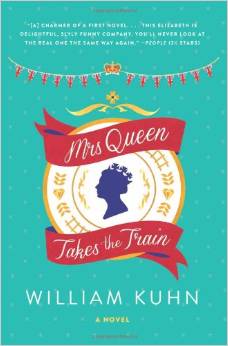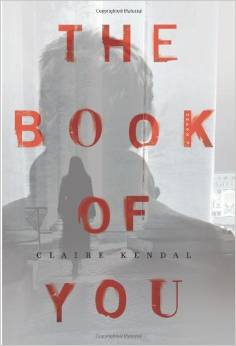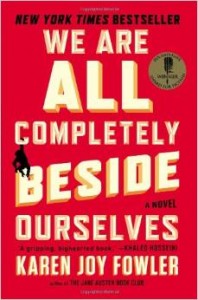Mrs. Queen Takes the Train by William Kuhn
 What is it about the “new arrival” shelves at the library? My
What is it about the “new arrival” shelves at the library? My enormous hoard small collection of books to be read is mocking waiting for me at home and still I bring home yet another book. It’s a disease.
Turned out Mrs. Queen Takes the Train was just the cozy ticket (pun intended!) for a rainy afternoon (yes finally a little rain here in the Bay Area).
From the back cover:
After decades of service and years of watching her family’s troubles splashed across the tabloids, Britain’s Queen is beginning to feel her age. She needs some proper cheering up. An unexpected opportunity offers her relief: an impromptu visit to a place that holds happy memories—the former royal yacht, Britannia, now moored near Edinburgh. Hidden beneath a skull-emblazoned hoodie, the limber Elizabeth (thank goodness for yoga) walks out of Buckingham Palace into the freedom of a rainy London day and heads for King’s Cross to catch a train to Scotland.
But a characterful cast of royal attendants has discovered her missing. In uneasy alliance a lady-in-waiting, a butler, an equerry, a girl from the stables, a dresser, and a clerk from the shop that supplies Her Majesty’s cheese set out to find her and bring her back before her absence becomes a national scandal.
See, now how could I resist this? Brewed myself a cup of tea, put on my favorite comfy sweater and set to it.
This is a modern view of the Queen and her past travails including the Diana years and the ebbing of her subject’s support. We get a view into the inside workings of the palace, the many roles required to handle the Queen, palace protocols and the many obligations of royal duty. As an Anglophile, I found this aspect of the story fascinating.
Despite escaping the palace, the Queen has difficulty shaking her royal attitudes and boundaries. Her lack of understanding how the world works without attendants is amusing as she waits for others on the train attend to her needs and address her correctly – but she prevails and finds herself relaxing with the commoners. I found myself empathizing with the Queen as she heads to the Britannia and memories of happier times. After all, who would want that job thrust upon them while still just a young girl?
The motley crew of attendants that follow the Queen to Scotland have their own compelling stories to tell – enemies become friends, lovers come out of the closet, and the grieving find some solace.
The novel has been compared to another fictional tale of the Queen, The Uncommon Reader, by Alan Bennett.
Mr. Kuhn slyly refers to this other book in this novel:
“‘Did you read the one about The Queen becoming a reader?’ said the woman in spectacles to the young man at her side.`I did enjoy that one. So funny. And of course, being a reader myself, I liked that side of it.'”
The film The Queen is also referred to in this up-to-date take on British royalty.
Mrs. Queen Takes the Train abounds with dry, British humor and social commentary. Mr. Kuhn tackles the homeless, terrorism, race relations, and mental illness. What I found fascinating was how the author gave the Queen a human side (she does yoga and attempts a computer) but still maintains the respectful dignity due a British monarch.
In the end the Queen must once again return to the palace and assume the duties of her crown- but with a fresh perspective and the reader is left to imagine she will find them less burdensome.
Note: Read Mr. Bennett’s book, wherein the Queen discovers a bookmobile outside the palace gates and revels in the delights of reading for pleasure
Cutting for Stone by Abraham Verghese
 Throwback Thursday or Past Reads
Throwback Thursday or Past Reads
Before I started this blog, I kept notebooks of the books I’d read. I began years ago in order record my thoughts as a book group member and then later just so I wouldn’t purchase or (yikes) re-read the same books. Don’t smirk, you’ve done it too! I thought I would share some of my top good reads on random Thursdays.
Today it’s Cutting for Stone, by Abraham Verghese.
From the publicity blurb:
Marion and Shiva Stone are twin brothers born of a secret union between a beautiful Indian nun and a brash British surgeon. Orphaned by their mother’s death and their father’s disappearance, bound together by a preternatural connection and a shared fascination with medicine, the twins come of age as Ethiopia hovers on the brink of revolution.
Moving from Addis Ababa to New York City and back again, Cutting for Stone is an unforgettable story of love and betrayal, medicine and ordinary miracles–and two brothers whose fates are forever intertwined.
Most of my reader friends disliked this novel, could not get into it, or found it dull and overwritten. As a member of the minority I was swept away into this brilliant and powerful saga.
Yes, it’s a Saga with a capital S – an epic tale that follows twisty, messy lives The tale takes the orphan twins from their birth in a medical clinic–through the frightening coups in Ethiopia — to New York City where they become successful surgeons in their own rights.
The twins come of age at the Ethiopian medical clinic where they were abandoned at birth and they suffer the consequences of their youthful carelessness and their unreliable makeshift family. The twins’ (twin’s?) lives are complicated yet enriched by these fascinating and crooked characters — a misguided, often drunk, but good-hearted doctor, a female OB who is overly sentimental, yet cruel and unforgiving not to mention the various thugs and manipulators who draw the boys in and out of trouble
The author is a surgeon and his professional insight is throughout the book. The medical scenes are extremely graphic and eyeopening – there are plenty of mishaps, botched surgeries and the genital mutilation scenes are not for the queasy. But Mr. Verghese also did some fine research. The history and culture of Ethiopia is one of the highlights of the story — both fascinating and horrifying. The author writes with both beauty and harshness and I guarantee you will stop in the middle of reading to marvel at his remarkable prose.
Yes, this book is sometimes slow going and there are many side tracks. Other readers found the detail overwritten – whereas, I found that the many-layered descriptions enriched the remarkable story.
You’re on notice – Cutting for Stone is messy, appalling and sometimes confusing. This is not a light novel and, at 670 pages, this is a demanding read. Nonetheless, I found it, like life itself, full of love and cruelty — joy and sadness. A Saga with a capital S.
The Moment of Everything by Shelly King
 I really must expand my repertoire, but, like the Halloween candy lurking in my cupboard (Reese’s PB cups if you must know), I just can’t resist yet another book about books and bookstores. Better yet, The Moment of Everything is set in Silicon Valley (check), takes place in the present (check) and, yes — centers around a used bookstore (check check).
I really must expand my repertoire, but, like the Halloween candy lurking in my cupboard (Reese’s PB cups if you must know), I just can’t resist yet another book about books and bookstores. Better yet, The Moment of Everything is set in Silicon Valley (check), takes place in the present (check) and, yes — centers around a used bookstore (check check).
From the publicity blurb:
Maggie Duprès, recently “involuntarily separated from payroll” at a Silicon Valley start-up, is whiling away her days in The Dragonfly’s Used Books, a Mountain View institution, waiting for the Next Big Thing to come along.
When the opportunity arises for her to network at a Bay Area book club, she jumps at the chance — even if it means having to read Lady Chatterley’s Lover, a book she hasn’t encountered since college, in an evening. But the edition she finds at the bookstore is no Penguin Classics Chatterley — it’s an ancient hardcover with notes in the margins between two besotted lovers of long ago. What Maggie finds in her search for the lovers and their fate, and what she learns about herself in the process, will surprise and move readers.
I found much to enjoy in this novel. The Dragonfly bookstore is wonderfully formed — its haphazard used book selection, an OPEN sign where the letters slide to read NOPE when closed, a mean tempered cat, and its fair share of quirky customers.
Ms. King beautifully captures Silicon Valley and, having been in high-tech for many years, I kneel to her bulls eye observational skills – she perfectly captures high tech geeks seeking obscure science fiction paperbacks, gaming parties and especially the snooty meeting of the “Silicon Valley Women’s Executive Book Club” in a pristine home with its state-of-the-art kitchen.
The mystery of the love notes written in the margins of a battered old copy of Lady Chatterley’s Lover is enchanting.
The plot is multi-layered and fast paced — there’s lots going on. Maggie only half-attempts to find another job and spends her days reading romance novels. She tries to fend off her narcissistic mother and is having a torrid love affair (or is it?). To try and stay sane, she starts to volunteer at the Dragonfly – attempting to bring it into the 21st century and the red in order to compete with big book store across the street. On top of all this, she is obsessed with mystery of the love notes in the book. Sometimes Ms. King loses control of these story lines and they become disjointed — but keep reading by the next chapter you’ll be back on course…and I’ll caution you, the ending is a tad predictable.
But in the end, I found the best part of The Moment of Everything was Ms. King’s engaging and witty voice. I found myself both grinning, and at times giggling throughout this book. Given the realm of grim novels out there (Dystopia anyone?) a novel that makes you smile is perhaps the best recommendation.
My favorite quote
“The kind of people who come to the Dragonfly don’t just own books, they need them, crave them, find it impossible to breathe without them. They come because they are in love with the store itself, with its handled wares and their untold takes. They come because they are wondering about about the people who owned all these books before. The come because the people whose paths they cross are like the books they find, a bit worn around the edges, waiting for the right person to open them up and take them home.”
Review copy provided by Grand Central Publishing via NetGalley.
The Book of You by Claire Kendal
 His name is Rafe, and he is everywhere Clarissa turns. What could have been a formula stalker thriller, is luckily so much more. It’s a creepy, often graphic read, and with my husband out of town, I checked the door was locked and read with several lights on in the house.
His name is Rafe, and he is everywhere Clarissa turns. What could have been a formula stalker thriller, is luckily so much more. It’s a creepy, often graphic read, and with my husband out of town, I checked the door was locked and read with several lights on in the house.
Clarissa, as the main character, develops as the book progresses. She hides, cowers and seems vulnerable , but the reader will cheer the bravery in her relentless gathering of evidence against Rafe. Upon police advice, she keeps a small journal “The Book of You” detailing every stalking move Rafe makes. And while repulsed, she also keeps all his “gifts” and lurid photos – all in the hopes of gathering enough evidence to have him arrested. The story is told interspersed between her journal entries and current time.
The stalking soon becomes part of her everyday as she attends jury duty, meets another man and tries to carry on a normal life. She keeps Rafe’s stalking, her journal and her fear a secret from everyone – adding to the suspense of the book.
Most compelling was how the author, little by little, lets the reader fall into the mind and feelings of a stalking victim, how they try and maintain normalcy, how their lives are turned into a mine field of psychological terror, and how even the simple things that brought them joy (Clarissa’s sewing) can be made dirty. This is what sets this debut thriller apart from the standard. The ending was so good, I raced through the last few chapters and then the next morning re-read them to savor the twists of the plotting.
In several instances the narrative breaks down and defies logic, and the dialogue can be stilted and poorly crafted – especially from the neighbor lady — “You think I’m just a sweet old lady, Clarissa, a kindly spinster who knows nothing and has experienced nothing….” arghhh.
But those two minor critiques did not stop me from devouring this chilling read and it still lingers in my mind.
Advanced Reading Copy provided by Harper Collins
We Are All Completely Beside Ourselves by Karen Joy Fowler
 Review copy provided by Penguin Group via NetGalley.
Review copy provided by Penguin Group via NetGalley.
I’d been hearing the ravingly positive reviews of this novel and so was thrilled to receive an Netgalley review copy. I started the novel and was immediately bogged down. The novel begins in the center of the story and through flashbacks the secrets are revealed. I stuck with it and learning the (not-so-secret) surprise that our narrator Rosemary was raised with a “sister” Fern who happened to be a chimp and disappeared when Rosemary was five years old.
This reveal turned out to be the most interesting part of the novel
Now I was intrigued but still having trouble slogging through the flashbacks, and overly complex story lines.
I get that this unusual chimp fostering experiment had a long armed impact on various members of the family — especially Rosemary and often the writing is magical, funny and warm — but I could not finish this book.
I had trouble relating to any of the characters and found the this ever-churning tale of family loss, coming of age, and animal abuse extremely sad. Beware — the last part of the book involves gut-wrenching and sickening animal experiments and that is where I stopped reading.
Maine by J. Courtney Sullivan
I’d had this book on my shelf for ages and could never get past the first few chapters, so donated it to the Friends of the SF Public Library and forgot about it.
Then, I discovered I was going to be in Maine, so checked it out as a Kindle book from the library – that’s just how I roll folks.
T his novel tells the tale of three generations of Kelleher women; Alice – the cruel matriarch, Kathleen – flawed, recovering alcoholic, Anne Marie – duty-bound daughter-in-law, and Maggie – the young hapless victim.
his novel tells the tale of three generations of Kelleher women; Alice – the cruel matriarch, Kathleen – flawed, recovering alcoholic, Anne Marie – duty-bound daughter-in-law, and Maggie – the young hapless victim.
Because I planned to read this while at a friends camp (cottage) on a lake in Maine, I thought this would be the perfect novel. But, turns out Maine (the state) does not really have any role or influence on Maine, the book.
Despite the back cover/inside flap copy this book is NOT a fun beach read about a family’s enjoyable summer days spent at their summer house in Maine — there’s no fun in this Maine. Where’s the lobster dinners eaten outside while slapping the mosquitoes, the chilly early morning swims, or the lazy hot afternoons reading on the porch?
Maine is a dark and grim expose of women joined by dysfunctional drama. Told in alternating narratives, each chapter is the voice of a different character. The author sets up the plot of past hatreds and buried secrets and then lets each character delve into their viewpoints, resentments and pain.
The book is extremely well-written and really starts to take off halfway through, when the women come together in Maine at the family summer house. But, I found it hard to relax and just enjoy this book. This is a book where motives have to be analyzed and resulting actions dissected – a good book group discussion could result from the family dynamics. And as a bravo to Ms. Sullivan, much of the family dysfunction is made real and familiar for anyone with a family — issues or not.
Perhaps that’s what Ms. Sullivan meant to achieve – an deep, unflinching look into a flawed and dysfunctional family.
So, don’t be mislead by the book’s “summer beach read” promotional copy and do read Maine if you want a well-written, darkly real and unflinching family saga.
Quote: “…Ann Marie sat at every family dinner and listened to them tell the same stories over and over. She never met a family so tied up in their own mythology.”





